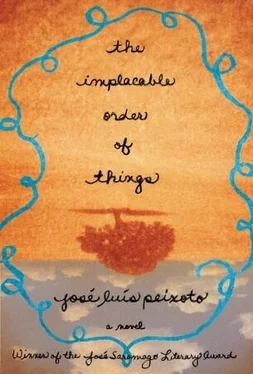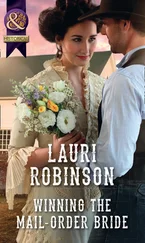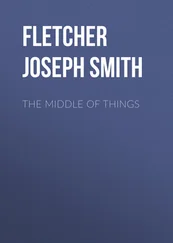I didn’t sit down. Still standing in the kitchen, with my gaze fixed on nothing, as if fixed on the horizon, I felt a hot breeze that brought with it all the sounds of the backyard, that outlined my body inside my dress and that took it a little farther, like a flag. I placed my hands on the small mass in my belly and thought it was death inside me. I have death inside me. My gaze and the breeze stopped. Slowly, overcoming the force of grieving hands present in each movement, I crossed the kitchen and stabbed a potato with the fork, and it was already cooked through. With the fork and the wooden spoon and with profound resignation, as if it were a task for the condemned, I mashed the potatoes in the soup. And my feet stepped to the back door, from where I watched the sun’s rays passing through the leaves of the trees and piercing the shade all the way to the ground. Delineated, well-defined sun rays, like those that penetrate the quiet water behind dams and also become water, perfect rays of luminous water. And amid the peacefulness I heard the song of the sparrows, the scattered and harmonious noise of the sparrows, like a distant silence, still tolerated, still allowed by the morning’s mild heat, and the uninterrupted whispering, the infinite whispering of my mother, like a sound from earth, like a sound from the beginning of the world. I drew near to my mother, to her body hunched over something, to her flaccid, old-woman’s body. She was hunched over a figure she had sculpted. I drew nearer, to see. And it was me. That face made of soil and small stones and grass was me, as if it were made of skin. It was me. Those hands calmly resting on the figure’s belly were mine, with the fingernails and lines across the knuckles in perfect detail. It was me. I lifted her up and we stood there, mother and daughter. With the morning all around us. I took her hands. She didn’t look at me, but for the first time in my life I was certain that she saw me. I know that my eyes betrayed a grief as large as the morning, an invisible grief, in the moment when the invisible was all that could be seen. And time was that moment multiplied over and over. Our hands clasped over and over, reaching out in front of us and with our arms ending at the same place where our hands were clasped. Our gazes over and over, with their weight like the world, like the earth and the static gesture of things existing. And within that vast time there existed the word mother, as if it had never existed before. The word mother that I didn’t say, but that was. Mother. I took her into the kitchen. I sat her down in a chair. Slowly, one by one, I removed the pins of her hair bun. I let down her long and smooth, gray and white hair. I untangled it with long strokes of the comb until it fell over her shoulders and down her back. I ran my fingers through her hair. I felt the strands slipping through my fingers. I redid her hair bun. Her face looked cleaner and younger. I gave her something to eat. Spoonful by spoonful, as if I were counting them and saying one two three. As if someone were secretly and silently counting them, so that they seemed inexplicably counted. I fed her the soup until the spoon clanged against the bowl, which I tilted to scoop out the last drop. I washed her face and dressed her. I brought her some clothes that looked like new, all washed and ironed, some nice clothes. A skirt and a blouse. I dressed her and took her into the bedroom. In between her lips’ mumbling, while I made the bed, I noticed that the faint sounds of the man shut up in a windowless room writing had grown yet fainter and slower, the ink sticking to the paper with the languid sigh of a flower, as if the words had suddenly taken on new meanings. And I again took my mother’s hands into my own. Our gazes were made of silence. The silence was death. I laid her down in bed. I positioned her head on the pillow. I pulled her feet together. I joined her hands on top of her chest. My mother against the white sheets. Purity. The air like cool water on her skin. The clean whitewash of the walls dawning perpetually. My mother, a girlish mother, mother, a childish mother, skin, girl, mother. I stroked her face gently, as if I weren’t touching it, and, without touching it, felt it. I looked at her. I looked at my mother for the last time, and I left her there. Mother, as if you were just resting, as if you were just waiting for sleep to arrive. Mother, how I’d like to have held you in my arms, how I’d like to have been held by yours. For you death isn’t cruel, mother, since you died to everyone a long time ago, since you only kept existing to remind me of love, and now that nothing in me can turn back, now that I’m sheer vertigo, your mission is finished and you can rest. Farewell, Mother. Thank you, silence. In the kitchen I placed the scarf on my head and tied it around my neck. I went out without looking back but imagining the cool shadows, the noises that would arrive from the street for no one at all to hear, the kitchen forlorn and forgotten, like a coffin beneath the world.
The sun weighs on me like something I carry within. I carry the sun inside me and calmly pour out all its light and heat over the fields. It’s too late to turn back, since there’s never any turning back. Only the regret for what we didn’t choose persists, exists. Only the old age of the cork trees, the sculpted shape of the olive trees, stones suspended in the sky and in this earth crossed by the flight of birds, this earth, the world’s age and clarity, my eyes that are the sky and the cork and olive trees, my eyes that weep without weeping, this road I’ve walked a thousand times and a thousand times it’s the same, I, I and the sound of the earth, the crunching of the sand under my feet. And I walk on as if standing still, I feel as if I sometimes force my legs to stop, I feel them standing still, and yet I walk on. Despair and the end are approaching. And despair and the end, now I know, are the serenity of an eternal and irreparable solitude, they’re a grief that’s an eternal and irreparable suffering, everything eternal and everything irreparable, they’re the silence of someone crying all alone on an infinite night. The Mount of Olives isn’t far and I see old Gabriel. I feel my legs walking, I speed them up, I try to flee, but I’m standing still in front of him. He looks at me for years and years and says don’t go. I’m suddenly old like him, I feel the enormity of his life in that gaze that is set on me and says don’t go. He says don’t go, and the sun tortures him even more. There’s not a breeze or a cool moment in his face. I turn from his gaze and go on. Time doesn’t belong to me, nor does life, or words, or the water of springs and fountains. And old Gabriel, more than his face, is a gaze that knows everything, is the name of solitude talking to itself, is the word death suffering its own fatal torment. He’s more than his face but is also his face, his sorrow, and his tenderness. More than his shadow, he’s also his shadow. His childish gaze full of certainties. His fear. Behind me, an instant. Old Gabriel, crushed by a hand or by a mystery or by a secret, falls dead on the ground that knows him, that knew his one hundred and fifty years but that doesn’t remember him now that he’s dead. His body, lying on top of the earth, his grave, his dead body, visited by sparrows that happen to alight on his chest. His body, like a furrow of plowed land beneath the sun. His dead body shouting all the silence of his solitude across the sky, down the road where I go on, over the fields which are the world. And the day’s hottest hour immortalizes this death and its splendor, immortalizes death, and each moment is this infinite death in all places. And I go on. I go on. I place my hands on my belly, on my dead son. I carry death inside me. The sun shouts the vastness of the fields and my sadness. In the depths of my gaze and inside me, I see the farmstead. I go on. I’m solitude.
Читать дальше












